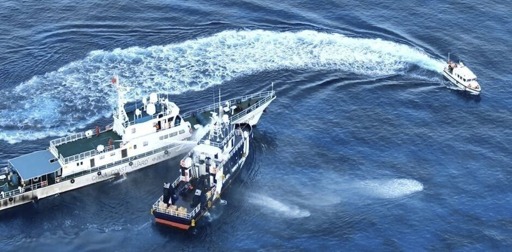Last week, Chinese coast guard vessels rammed and shot water cannon at Philippine ships in the South China Sea. The incident was well within the Philippines’ exclusive economic zone and was completely unprovoked.
It is the latest example of a sustained pattern of Chinese maritime coercion that has intensified over the past three years. Despite the growing frequency and sheer aggression of these tactics, international attention and official rebukes have noticeably waned in the past 12 months.
For Australia, a nation whose prosperity and security relies on maritime trade, there can be no room for complacency or desensitisation. China’s maritime aggression puts Australia at risk.
…
History teaches that once coercion goes unchecked, it tends to escalate. The incident last week is not an isolated provocation, but part of a continued deterioration of security in the waters around us.
Australia has both the right and the responsibility to challenge the normalisation of this kind of maritime aggression. We can push back by calling out each incident, continuing to deepen our regional partnerships, accelerating the development of our naval capabilities, and reinforcing international maritime law.
Our future prosperity, and the security of generations to come, depends on it.



Its best to lean forward, Australia doesn’t want to be jumping in when Indonesia is feeling on the backfoot. Aus wants to be pushing robustly for uniform rules of the sea across the board.
Whats the difference in international waters in the South China Sea and the Indian Ocean? Its legally nothing, they’re governed by the same law of the sea agreement.
As the article discusses, if you don’t push your opposition, cynical actors will take advantage and establish as much dominance as possible.
Australia should be acting as a convener for South-East Asian, Pacific, and East Asian countries but you’re essentially right, Australia has to respect the sovereign wishes of each other country where clear lines of sides are marked, but where there is grey, Australia must act to minimise the potential for China to dominate it’s (China’s) rivals or neighbours in the region.
ASEAN has previously made it clear they don’t want Australia as a “convenor” or leader of anything in SEA. Maybe that’s changed in the last few years since China started getting aggressive but if so I’ve seen nothing to indicate it.
Australia needs to be a stalwart ally, but SEA and the South China Sea needs to be lead by Japan, Korea, Phillipines, Vietnam and SEA by Indonesia, Thailand ,Singapore& Phillipines.
This has been made VERY VERY clear. They view our involvement as an extension of imperialism and don’t want it.
Australia has always supported our allies militarily, and we will continue to do so, but we also don’t want to be where we’re not wanted.
America once wanted to be world police now they don’t, that leaves a vacuum in SEA but we’re not the ones to pick up that mantle
Nah, its practically impossible for Australia to be a leader of any sort, too small.
Thats why i only say convener, because of the geopolitical position, as an invested and interested party, but back a bit, it means Australia is in a more neutral position in discussions which can be a good place for a convener to come from.
Agreeing on the direction of discussions but more open minded to conflicting policy direction that may arise.
But yeah, as you say, Australia must act in support of our allies in this region as the primary policy setting in any of this and fill the role they need from Australia.